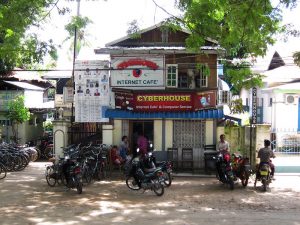Today, Reuters published a detailed report revealing that Myanmar’s telecom and internet service providers were ordered to install intercept spyware in the months leading up the military coup in February.
The investigation, by Fanny Potkin and Poppy McPherson, claims that this spyware technology would allow the country’s armed forces to eavesdrop on the communications of citizens. Specifically, it was intended to give the military “the power to listen in on calls, view text messages and web traffic including emails, and track the locations of users without the assistance of the telecom and internet firms.”
Citing more than a dozen sources with knowledge of the plan, Reuters claims that the idea of a spyware intercept – a “lawful intercept,” in industry parlance – was first proposed to the telecommunications sector in late 2019 but that pressure to install such technology increased in late 2020.
The orders were delivered by ex-military officials at the Ministry of Transport and Communications who presented them as coming from the former civilian government led by the National League for Democracy (NLD), although the extent of NLD support for (or awareness of) the plan remains unclear.
While “lawful intercepts” are conducted by law enforcement agencies in many democratic countries, the report states, in Myanmar there would be no legal or regulatory safeguards to prevent these powers from being abused.
Reuters was not able to establish how broadly such spyware has been installed and deployed, something that has been resisted by key telecoms operators and ISPs. But it presented anecdotal evidence that military and intelligence agencies have been conducting some call interceptions of tracing of SIM cards since the coup, suggesting at least some degree of compliance.
While it is unclear the extent to which the alleged spyware plan can be taken as a sign of advance planning for the coup that unfolded in the early morning hours of February 1, the move would be clearly congruent with the junta’s efforts to establish a stranglehold over electronic communications.
Shortly after the coup, the military ordered the blocking of websites, including the ubiquitous Facebook, and virtual private networks that are used to evade internet filtering. It has instituted nightly internet blackouts. In March, it also cut mobile data, depriving much of the population of access to the internet.
Citing three industry sources, the Reuters article also reveals that within days of the coup, the army secretly ordered telecom firms to block the phone numbers of activists and opponents of the junta, providing the firms with lists of names.
The article testifies the extent to which the internet has become a “virtual battlefield” in Myanmar since the coup, to quote the title of a new report from the International Crisis Group (ICG) that was released yesterday.
The ICG report examines the junta’s attempts to establish a stranglehold over the internet, which built on decisions taken by the former NLD government. Particularly, it details the Tatmadaw’s plans to develop a crude national “intranet” that allows mobile access only to approved, or “whitelisted” applications, such as online banking apps.
ICG argues that the intranet plan reflects the junta’s lack of preparedness for the protests that followed the coup, and its lack of technological sophistication. Indeed, it suggests that Myanmar is unlikely to install something on the order of China’s “great firewall,” which requires “not only restricting access to the global internet but also developing an ecosystem of local applications and actively censoring local content.”
While the junta’s crude internet controls have succeeded in undermining the ongoing anti-coup protest movement, the ICG suggests they have also presented it with a thorny strategic challenge. As the report argues, “Maintaining an internet blackout for an extended period of time will not only impede a well-functioning economy and society, and isolate Myanmar from the rest of the world, but also impair government operations, and prevent the military from communicating with its supporters through social media.”
Moreover, even if the regime were to receive assistance from sympathetic outside actors (such as China) that would enable it to expand its technological capacities, the extent of the domestic opposition is such that it would “make it difficult to recruit the local expertise needed to maintain a more repressive system.”
In conclusion, the ICG report urges international technology companies and telecoms firms to keep Myanmar’s shrinking online space “as open and its users as safe as possible,” for instance by expanding free access to secure virtual private networks and educating users about digital security.
The Norwegian telecom firm Telenor, which recently announced it was writing off the value of its operation in Myanmar due to the post-coup situation, last week issued a statement calling for whitelisting to be “abandoned.”
In a 2000 speech, U.S. President Bill Clinton famously quipped that controlling the internet would be akin to “nailing Jell-O to a wall,” predicting that “liberty will spread by cell phone and phone modem” through China. A few years later, China’s communist government proved Clinton wrong. If Myanmar’s military junta manages to replicate its neighbor’s feat – or even just a crude facsimile of it – it will likely be counting the economic and political cost for many years to come.

































